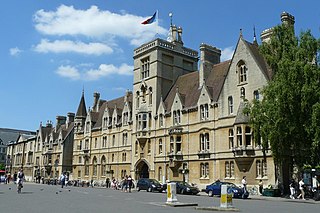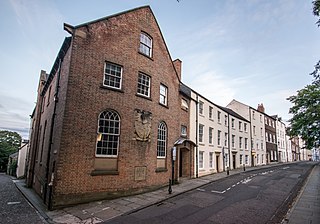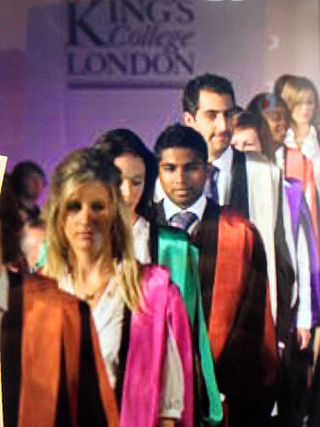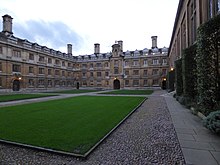
A college is an educational institution or a constituent part of one. A college may be a degree-awarding tertiary educational institution, a part of a collegiate or federal university, an institution offering vocational education, or a secondary school.

Trinity College is a constituent college of the University of Cambridge. Founded in 1546 by King Henry VIII, Trinity is one of the largest Cambridge colleges, with the largest financial endowment of any college at either Cambridge or Oxford. Trinity has some of the most distinctive architecture in Cambridge with its Great Court said to be the largest enclosed courtyard in Europe. Academically, Trinity performs exceptionally as measured by the Tompkins Table, coming top from 2011 to 2017. Trinity was the top-performing college for the 2020-21 undergraduate exams, obtaining the highest percentage of good honours.

The University of Cambridge is composed of 31 colleges in addition to the academic departments and administration of the central university. Until the mid-19th century, both Cambridge and Oxford comprised a group of colleges with a small central university administration, rather than universities in the common sense. Cambridge's colleges are communities of students, academics and staff – an environment in which generations and academic disciplines are able to mix, with both students and fellows experiencing "the breadth and excellence of a top University at an intimate level".

Balliol College is one of the constituent colleges of the University of Oxford in England. One of Oxford's oldest colleges, it was founded around 1263 by John I de Balliol, a landowner from Barnard Castle in County Durham, who provided the foundation and endowment for the college. When de Balliol died in 1268, his widow, Dervorguilla, a woman whose wealth far exceeded that of her husband, continued his work in setting up the college, providing a further endowment and writing the statutes. She is considered a co-founder of the college.

Trinity College is one of the constituent colleges of the University of Oxford in England. The college was founded in 1555 by Sir Thomas Pope, on land previously occupied by Durham College, home to Benedictine monks from Durham Cathedral.

Queens' College is a constituent college of the University of Cambridge. Queens' is one of the older colleges of the university, founded in 1448 by Margaret of Anjou. Its buildings span the River Cam with the Mathematical Bridge and Silver Street connecting the two sides.

St Catharine's College is a constituent college of the University of Cambridge. Founded in 1473 as Katharine Hall, it adopted its current name in 1860. The college is nicknamed "Catz". The college is located in the historic city-centre of Cambridge, and lies just south of King's College and across the street from Corpus Christi College. The college is notable for its open court that faces towards Trumpington Street.

Trevelyan College is a college of Durham University, England. Founded in 1966, the college takes its name from social historian George Macaulay Trevelyan, Chancellor of the University from 1950 to 1957. Originally an all-female college, the college became fully mixed in 1992.

St Chad's College is a recognised (independent) college of Durham University in England, founded in 1904 as an Anglican hall for the training of Church of England clergy. The main part of the college is located on the Bailey, occupying nine historic buildings at the east end of Durham Cathedral. It neighbours Hatfield College to its north, while St John's College and St Cuthbert's Society are to its south. The college is named after Saint Chad, a seventh-century Anglo-Saxon bishop known for spreading Christianity in the Mercian kingdom.
A collegiate university is a university in which functions are divided between a central administration and a number of constituent colleges. Historically, the first collegiate university was the University of Paris and its first college was the Collège des Dix-Huit. The two principal forms are residential college universities, where the central university is responsible for teaching and colleges may deliver some teaching but are primarily residential communities, and federal universities where the central university has an administrative role and the colleges may be residential but are primarily teaching institutions. The larger colleges or campuses of federal universities, such as University College London and University of California, Berkeley, may be effectively universities in their own right and often have their own student unions.

Trinity Christian College is a private Christian college in Palos Heights, Illinois. It was founded in 1959 by a group of Chicago businessmen who wanted to establish a college providing students with a Christian higher education in a Reformed tradition as a college in Illinois. The college offers degrees in more than 70 programs of study.
Housekeeping is the management and routine support activities of running an organized physical institution occupied or used by people, like a house, ship, hospital or factory, such as tidying, cleaning, cooking, routine maintenance, shopping, and bill payment. These tasks may be performed by members of the household, or by persons hired for the purpose. This is a more broad role than a cleaner, who is focused only on the cleaning aspect. The term is also used to refer to the money allocated for such use. By extension, it may also refer to an office or organization, as well as the maintenance of computer storage systems.
In the universities of Oxford, Cambridge, and Dublin, Bachelors of Arts are promoted to the degree of Master of Arts or Master in Arts (MA) on application after six or seven years' seniority as members of the university. It is an academic rank indicating seniority, and not an additional postgraduate qualification, and within the universities there are in fact no postgraduate degrees which result in the postnominals 'MA'. No further examination or study is required for this promotion and it is equivalent to undergraduate degrees awarded by other universities.
Dean is a title employed in academic administrations such as colleges or universities for a person with significant authority over a specific academic unit, over a specific area of concern, or both. In the United States and Canada, deans are usually university professors who serve as the heads of a university's constituent colleges and schools. Deans are common in private preparatory schools, and occasionally found in middle schools and high schools as well.
In Western universities, a Bachelor of Divinity or Baccalaureate in Divinity is a postgraduate academic degree awarded for a course taken in the study of divinity or related disciplines, such as theology or, rarely, religious studies.
Colleges within universities in the United Kingdom can be divided into two broad categories: those in federal universities such as the University of London, which are primarily teaching institutions joined in a federation, and residential colleges in universities following the traditional collegiate pattern of Oxford and Cambridge, which may have academic responsibilities but are primarily residential and social. The legal status of colleges varies widely, both with regard to their corporate status and their status as educational bodies. London colleges are all considered 'recognised bodies' with the power to confer University of London degrees and, in many cases, their own degrees. Colleges of Oxford, Cambridge, Durham and the University of the Highlands and Islands (UHI) are 'listed bodies', as "bodies that appear to the Secretary of State to be constituent colleges, schools, halls or other institutions of a university". Colleges of the plate glass universities of Kent, Lancaster and York, along with those of the University of Roehampton and the University of the Arts London do not have this legal recognition. Colleges of Oxford, Cambridge, London, and UHI, and the "recognised colleges" and "licensed halls" of Durham, are separate corporations, while the colleges of other universities, the "maintained colleges" of Durham, and the "societies of the university" at Oxford are parts of their parent universities and do not have independent corporate existence.

A common room is a group into which students are organised in some universities, particularity in the United Kingdom, normally in a subdivision of the university such as a college or hall of residence, in addition to an institution-wide students' union. They represent their members within the hall or college, operate certain services within these institutions such as laundry or recreation, and provide opportunities for socialising. There are variations based on institutional tradition and needs, but classically the following common rooms will exist:

Gonville and Caius College, often referred to simply as Caius, is a constituent college of the University of Cambridge in Cambridge, England. Founded in 1348 by Edmund Gonville, it is the fourth-oldest of the University of Cambridge's 31 colleges and one of the wealthiest. In 1557, it was refounded by alumnus John Caius. The college has been attended by many students who have gone on to significant accomplishment, including fifteen Nobel Prize winners, the second-highest of any Oxbridge college after Trinity College, Cambridge.

The University of Cambridge is a public collegiate research university in Cambridge, England. Founded in 1209, the University of Cambridge is the third-oldest university in continuous operation.

The academic dress of the United Kingdom and Ireland has a long history and has influenced the academic dress of America and beyond. The academic square cap was invented in the UK as well as the hood which developed from the lay dress of the medieval period.













